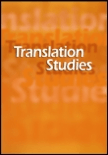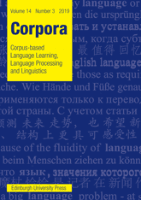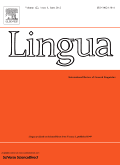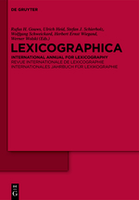
Quaderns de Filologia-Estudis Linguistics
Scope & Guideline
Navigating the Complexities of Language Together.
Introduction
Aims and Scopes
- Lexicography and Language Resources:
The journal publishes research on lexicography, including citizen-driven lexicographic efforts, the integration of digital resources like Wiktionary into educational curricula, and the development of contrastive dictionaries. - Corpus Linguistics and Semantic Analysis:
A significant emphasis is placed on corpus-based studies that analyze language use and semantic neology, particularly in relation to contemporary events such as the Covid-19 pandemic. - Translation Studies and Localization:
Papers often explore themes in translation studies, including machine translation, localization practices, and the role of technology in translation training, showcasing the evolving landscape of translation in the digital age. - Social and Ethical Dimensions of Language:
The journal addresses socially responsible lexicography and the impact of language on social issues, such as gender inequality and violence, reflecting a commitment to examining language in its socio-political context. - Emerging Technologies in Linguistics:
Research on the application of artificial intelligence in linguistics, including the use of Wordnet and big data, indicates a forward-thinking approach towards integrating technology into linguistic research.
Trending and Emerging
- Socially Responsible Lexicography:
There is a noticeable increase in research addressing the ethical dimensions of lexicography, highlighting the importance of socially responsible practices in dictionary-making and language documentation. - Digital Communication and Discourse Analysis:
The exploration of discourse in digital communication, particularly regarding social issues like gender violence and inequality, represents a growing area of interest, emphasizing the relevance of linguistics in contemporary societal debates. - Integration of AI in Linguistic Studies:
The application of artificial intelligence and big data in linguistics is becoming a prominent theme, reflecting broader technological advancements and their implications for language research. - Gender and Language:
Research focusing on gender-related issues in language and discourse is on the rise, indicating an increased awareness and analysis of how language shapes and reflects gender dynamics in society. - Localization and Cultural Adaptation:
The study of localization practices, particularly in relation to video games and digital media, is emerging as a significant area of research, showcasing the intersection of linguistics with cultural studies and media.
Declining or Waning
- Traditional Literary Translation:
Papers specifically focused on traditional literary translation practices seem to be less frequent, possibly being overshadowed by discussions on technology-assisted translation and localization. - Theoretical Linguistics:
There appears to be a waning interest in purely theoretical linguistics, as the journal increasingly favors applied linguistics and practical applications of linguistic research. - Historical Linguistics:
The focus on historical linguistics has decreased, with more emphasis on contemporary language use and current social phenomena rather than historical language changes or studies. - Standard Language Ideologies:
Research centered around standard language ideologies and prescriptive grammar has diminished, suggesting a shift towards more descriptive and inclusive approaches to language.
Similar Journals

Revue Roumaine de Linguistique-Romanian Review of Linguistics
Fostering Scholarly Dialogue in Linguistics.Revue Roumaine de Linguistique-Romanian Review of Linguistics, published by EDITURA ACAD ROMANE, is a distinguished journal dedicated to advancing the field of linguistics and promoting scholarly discourse in language-related research. With its ISSN 0035-3957, this journal has established itself as a valuable resource for researchers and practitioners alike, particularly within the linguistics and language categories where it holds a respectable Q3 ranking as of 2023. The journal covers a wide array of topics, focusing on both theoretical and applied linguistics, making it an essential platform for those interested in the latest developments, methodologies, and findings in the field. Although it currently does not operate under an open access model, the Romanian Review of Linguistics remains an impactful publication with its regular convergence of years from 2010 to 2023, providing a comprehensive archive for ongoing research endeavors. With its address located in Bucuresti, Romania, this journal continues to foster a vibrant academic community and supports the ongoing exploration of linguistic phenomena across diverse contexts.

Language Resources and Evaluation
Cultivating knowledge in language resources and evaluation.Language Resources and Evaluation, published by SPRINGER, is a leading peer-reviewed journal that focuses on the interdisciplinary field of language resources, evaluation, and their applications across various domains. With an impressive impact factor reflecting its academic rigor and influence in the fields of Education, Library and Information Sciences, Linguistics, and Language, this journal is categorized Q1 (2023) within these disciplines, underscoring its significance and high-quality contributions. Operating from the Netherlands, the journal has consistently delivered valuable insights since its inception in 1996, with ongoing publications continuing through 2024. Researchers and professionals are provided with open access options, fostering a global exchange of knowledge crucial for advancing the study and application of language technologies and resources. As it continues to rank exceptionally in Scopus, this journal serves as an essential platform for academics, offering a comprehensive understanding of the challenges and innovations in evaluating language resources.

Voprosy Leksikografii-Russian Journal of Lexicography
Unveiling Contemporary Issues in LexicographyVoprosy Leksikografii-Russian Journal of Lexicography, published by TOMSK STATE UNIVERSITY, is a premier journal dedicated to advancing the field of lexicography and linguistics. With an ISSN of 2227-4200 and E-ISSN 2311-3758, this journal has established itself as a vital resource for researchers and practitioners in the discipline. As a recognized Q1 journal in Linguistics and Language (2023), it ranks impressively in the Scopus database, placing within the top percentile of both Arts and Humanities and Social Sciences categories. The journal aims to promote scholarly discourse through rigorous research, innovative methodologies, and the exploration of contemporary issues in lexicography. Despite not being open access, it remains pivotal for anyone engaged in linguistic studies, providing essential insights and fostering academic collaboration in the Russian Federation and beyond. For emerging scholars and seasoned experts alike, Voprosy Leksikografii serves as an indispensable platform for disseminating high-quality research in the rapidly evolving landscape of language studies.

Quaderns-Revista de Traduccio
Navigating the Landscape of Translation and LanguageQuaderns-Revista de Traduccio, published by the Universitat Autònoma de Barcelona, is a prominent journal in the field of Linguistics and Language, which has garnered recognition for its scholarly contributions since its inception. With an ISSN of 1138-5790 and an E-ISSN of 2014-9735, this journal has maintained an active publication schedule across notable cycles, contributing valuable insights from 2011 to 2018 and continuing from 2020 to 2024. As a Q3 category journal in both Arts and Humanities and Social Sciences related to Language and Linguistics, it occupies an important niche, ranking #607 out of 1088 and #692 out of 1167 respectively. Though currently not an open-access journal, its rigorous peer-review process ensures that published articles meet high academic standards, making them relevant for researchers, professionals, and students alike. Housed in Cerdanyola del Vallès, Barcelona, this journal serves as a critical platform for the dissemination of cutting-edge translation studies and linguistics research.

Translation Studies
Bridging Cultures Through Innovative ResearchTranslation Studies is a premier journal in the field of linguistics and language, published by Routledge Journals, Taylor & Francis Ltd, and is recognized for its exceptional impact within the academic community, boasting a Q1 classification in Linguistics and Language as of 2023. With its ISSN 1478-1700 and E-ISSN 1751-2921, this journal serves as an eminent platform for disseminating groundbreaking research, theoretical advancements, and practical applications related to translation and interpreting studies. Covering a comprehensive scope, the journal publishes original research articles, critical reviews, and theoretical discussions, making significant contributions to both the arts and humanities as well as social sciences. The journal is published in the United Kingdom and has maintained a solid reputation from its inception in 2008 through to 2024. Positioned within the top ranks of Scopus in both the language and linguistics categories, it ensures visibility, making it an essential resource for scholars, practitioners, and students who wish to stay informed of the latest trends, methodologies, and discussions in translation studies.

Corpora
Elevating Linguistic Research to New HeightsCorpora is a leading journal in the field of Linguistics and Language, published by Edinburgh University Press. Since its inception in 2006, Corpora has established itself as a pivotal platform for scholarly discourse, focusing on the analysis and interpretation of linguistic corpora across various contexts. The journal is recognized for its rigorous peer-review process and boasts a commendable impact within its category, achieving a Q2 ranking in the 2023 Linguistics and Language quartiles. Moreover, it ranks in the 79th percentile in Arts and Humanities Language and Linguistics and in the 77th percentile in Social Sciences Linguistics and Language, underlining its significance in the academic community. While currently not an open-access journal, Corpora is accessible to a broad audience, encouraging contributions from researchers, professionals, and students eager to advance the field of linguistics through innovative research and insightful discourse. For those invested in linguistic studies and corpora analysis, Corpora offers a vital resource and forum for the dissemination of high-quality research.

LINGUA
Pioneering research for a deeper understanding of linguistics.LINGUA is a premier academic journal dedicated to the field of linguistics, published by ELSEVIER and based in the Netherlands. With an ISSN of 0024-3841 and an E-ISSN of 1872-6135, this esteemed journal has garnered a reputation for excellence, evidenced by its position in the top Q1 quartile in Linguistics and Language as of 2023. LINGUA serves as a vital platform for scholars, researchers, and students, showcasing innovative research and critical discussions across various linguistic subfields. The journal has demonstrated impressive Scopus rankings—151 out of 1088 for Language and Linguistics, and 176 out of 1167 in Social Sciences—placing it in the 86th and 84th percentiles, respectively. By providing a forum for the dissemination of advanced linguistic theories and their applications, LINGUA continues to significantly contribute to the academic community, making it an essential resource for anyone engaged in the study of language.

LEXICOGRAPHICA
Where Language Meets ScholarshipLEXICOGRAPHICA, published by WALTER DE GRUYTER GMBH, stands as an invaluable resource in the field of linguistics and language studies. With an ISSN of 0175-6206 and an E-ISSN of 1865-9403, this esteemed journal has garnered a solid reputation, reflected in its position within the Q2 quartile for linguistics and language as of 2023. Hailing from Germany, and with a robust publication history spanning from 1996 to 2023, LEXICOGRAPHICA offers a platform for scholarly discourse and innovative research concerning lexicography and its intersections with other linguistic fields. Ranked #442 in Arts and Humanities and #516 in Social Sciences by Scopus, it occupies a pivotal space in academic literature, making it essential reading for researchers, professionals, and students committed to advancing their understanding of language documentation and analysis. Although not open access, the journal’s commitment to high-quality peer-reviewed content ensures that it remains a respected outlet for original research, critical evaluations, and discussions that shape the future of lexicographic studies.

Studii de Lingvistica
Navigating the complexities of language and thought.Studii de Lingvistica is a premier open-access journal committed to advancing the field of linguistics and language studies since its inception in 2011. Published by EDITURA UNIV ORADEA in Romania, this scholarly platform aims to disseminate high-quality research that encompasses various aspects of linguistics, encouraging contributions from researchers and professionals worldwide. With an impact factor that reflects its relevance, the journal holds a prestigious position in the Q2 category of Linguistics and Language for 2023. Despite its relatively nascent H-index, Studii de Lingvistica has carved a niche for itself, ranking 1017th and 1094th in Scopus across Arts and Humanities and Social Sciences, respectively. Researchers, scholars, and students alike will find valuable insights and pioneering studies within its pages, making it a vital resource for those engaged in the nuanced exploration of language and its cognitive dimensions. Located at UNIVERSITATII ST NO 1, PAVILION C, ORADEA, BIHOR, ROMANIA, this journal continues to foster academic dialogue and innovation within the linguistics community.

Revista Espanola de Linguistica Aplicada
Connecting scholars to shape the future of language studies.Revista Espanola de Linguistica Aplicada is a prominent academic journal published by John Benjamins Publishing Co, specializing in the interdisciplinary fields of linguistics, education, and e-learning. With its ISSN 0213-2028 and E-ISSN 2254-6774, the journal has established a significant presence in Spain and beyond, showcasing innovative research and contributions in applied linguistics. The journal is recognized for its rigorous peer-review process and maintains impressive Scopus rankings, notably within the 72nd percentile for Arts and Humanities and 68th percentile for Social Sciences, reflecting its critical role in advancing the study of language and education. As of 2023, it holds a Q3 rank in Education and a Q2 rank in Linguistics and Language, underscoring its influence and relevance in these disciplines. Targeted at researchers, educators, and students alike, the journal aims to facilitate knowledge exchange and provide a platform for discussions that shape the future of linguistics.